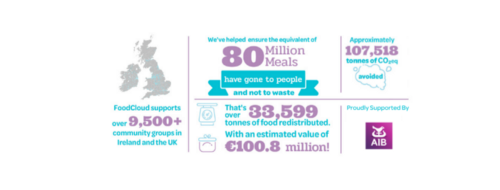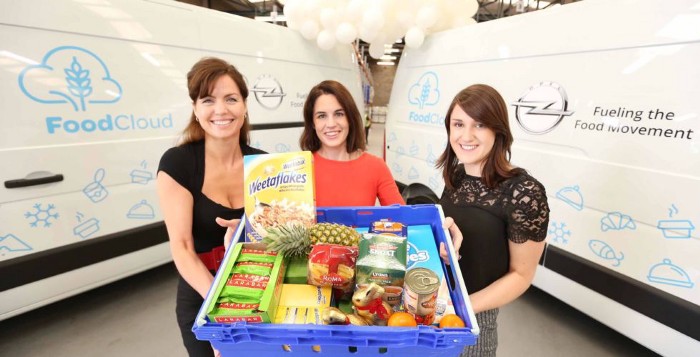Abstract
In Ireland, 1 in 11 people experience food poverty. At the same time, 1 million tonnes of food is thrown out by Irish consumers and businesses each year. What if there was a way to use this surplus food to feed those who need it?
Foodcloud is a social enterprise based in Ireland that connects people in food poverty with retailers that produce food surplus which would otherwise go to waste. It works as a platform to transport the food between the two groups. This ensures that less food is wasted and that charities get the supplies they need.
This Case Study is brought to you by Nelis’ 4REVS Research Program. Nelis is an NPO with an active and expanding network of young social innovators and leaders, sustainability practitioners, and creative minds from all continents (100+ countries) that enables us to provide experiential and on-the-ground knowledge. If you want to know more or be part of our network, please leave a comment! Or contact us in www.nelisglobal.org
Overall Description
Currently, retailers and manufacturers often find themselves with large surpluses of food due to order cancellations, mistakes in packaging and a variety of other factors. If fresh food products do not meet certain size requirements, they are sent to landfill by manufacturers. Retailers therefore deem perfectly good food unsuitable. This high quality food is wasted, costing retailers extra money.
Most food banks operate as local charities, receiving small, individual donations. They do not have the means to use the untapped potential of retailers and manufacturers on a macro-scale. Reliance on both monetary and individual food donations means expansion and growth are difficult to achieve. Charities focus on keeping the business operational as opposed to profitable. Furthermore, a more regulated and regimented system is difficult to implement since regular or large donations are not received. This means that a system of reliable support cannot be supplied to local charities.

Foodcloud is an Irish social enterprise that aims to reduce food poverty throughout Ireland and the UK. They take surplus food off the hands of retail suppliers and redistribute it to charities that can use the supplies. As a social enterprise, Foodcloud charges retailers for the service it provides, which helps fund a customer support team; warehouses as distribution ‘Hubs’, and an app that connects local charities and retailers.
Foodcloud uses an app where retailers can log their surplus food products. This then notifies local charities that food is ready for collection. Local charities can see these posts and then collect the food at an agreed upon time. Foodcloud also runs ‘Hubs’, or warehouses, which receive larger donations of food from manufacturers. This food is redistributed across the country. Foodcloud only accepts food that follows relevant food safety guidelines and is within the use by date. Businesses either deliver directly to one of Foodcloud’s Hubs or the food is collected by one of Foodcloud’s refrigerated vans.
The Foodcloud system has the ability to receive both ad-hoc and regular supplies of food from supermarkets. Due to their size and reach, they can provide a reliable stream of food to local charities in need of the food.
Foodcloud works with Tesco, Aldi, and Lidl, among others. Since launching, they have diverted the equivalent of 75 million meals from landfill waste and used this food to help many on the bread line. Foodcloud helps companies to reduce disposal costs while providing much needed food to charities such as homeless shelters and family support services. Charities can reallocate funds towards other essential services that support their underlying mission.
As a social enterprise, Foodcloud charges retailers a service fee to cover operational costs. This is comparable to a waste disposal service that retailers would otherwise pay to dispose of the excess food. In other words, retailers can use Foodcloud as a waste disposal service. For charities collecting surplus food from their local retailers, there is no charge. If charities collect food from the Foodcloud Hubs, the cost is based on the weight of the collected food. This covers the operational and upkeep costs of the three Hubs. Although there is a charge for charities, they save on average 90% on the retail price of items.
Overall, Foodcloud has redistributed 31,499 tonnes of food, which equates to approximately £83 million worth.
Main features or highliths
Foodcloud operates in two ways to combat food poverty:
○ Through an app where retailers can easily log details of excess food and charities are notified of this surplus.
○ Through Foodcloud ‘Hubs’ or warehouses which receive larger quantities of waste food and products with a longer shelf-life.
Smaller quantities of food are collected through the app. The Hubs collect larger donations by retailers which is distributed in a more regular and reliable manner, providing charities with food security.
Foodcloud conducts research to find where waste occurs within a supply chain and traces this back to manufacturers as well as retailers. Its customers therefore comprise 3 main categories: manufacturers, retailers, and charities.
Fees charged to retailers and charities (when collecting from hubs) cover operational costs. A regular income makes the business model sustainable. Foodcloud reinvests its profits in the company.
Why is this Revolutionary?
Foodcloud tackles food poverty using food that would have otherwise gone to waste. It appeals to retailers by reducing their waste disposal costs. Additionally, retailers can achieve environmental goals and use positive branding that reflects their eco-conscious actions.
Usually, the waste would go to landfill and contribute to carbon emissions. Additionally, since charities use excess food, they do not need to buy food from supermarkets, this reduces the carbon dioxide that would be emitted in the production of this food. Foodcloud’s system prevents an estimated 100,000 tonnes of unnecessary carbon dioxide emissions.
Local charities form relationships with retailers who supply their food through the app, this strengthens community relations.
Foodcloud developed an app to connect donors and recipients. The app is in use on retailer in-store devices and smartphones. There are 9,000 charitable recipients and 3,000 donating supermarkets on the platform. The app allows companies to find out how many meals they have donated alongside other key statistics, such as what food types are most likely to be left over and collected by charities. According to a spokesperson from Waitrose, the app also allows companies to better organise regular surplus food donations.
In 2017, Foodcloud won the Net Visionary Awards for Best use of technology for social good due to their app.
Concrete examples
Retailers
- Tesco was Foodcloud’s first retail partner in Ireland. Through their ‘No time for waste’ campaign, Tesco partnered with Foodcloud to utilise surplus food. Since joining forces in 2014, Tesco has donated a total of eight million meals to over 350 community groups across Ireland. Tesco have used Foodcloud’s app in the UK and Ireland, offering them a simple solution to food waste. According to the Community Food Programmes Manager of Tesco UK, the Foodcloud app collects valuable data, providing feedback which allows Tesco to improve store operations and reduce food waste.
- Aldi partnered with Foodcloud in 2014 to minimise food waste and reduce food poverty. It has donated 1.8 million meals to charities across Ireland. Aldi has achieved this through receiving donations from customers in-store as well as donating surplus food to local communities. This has saved charities an estimated £2 million overall.
Charities
- Rosepark Independent Living is a charity that supplies sheltered accommodation for elderly people in Dublin and is registered with Foodcloud. In 2017, they were able to save over £17,600 in food costs. This allowed them to provide better support services for residents in the sheltered accommodation and in the local area. Their work includes community outreach and improving social isolation experienced by elderly residents.
Article by: Bethan Hobson, 4REVS researcher (and more:)


